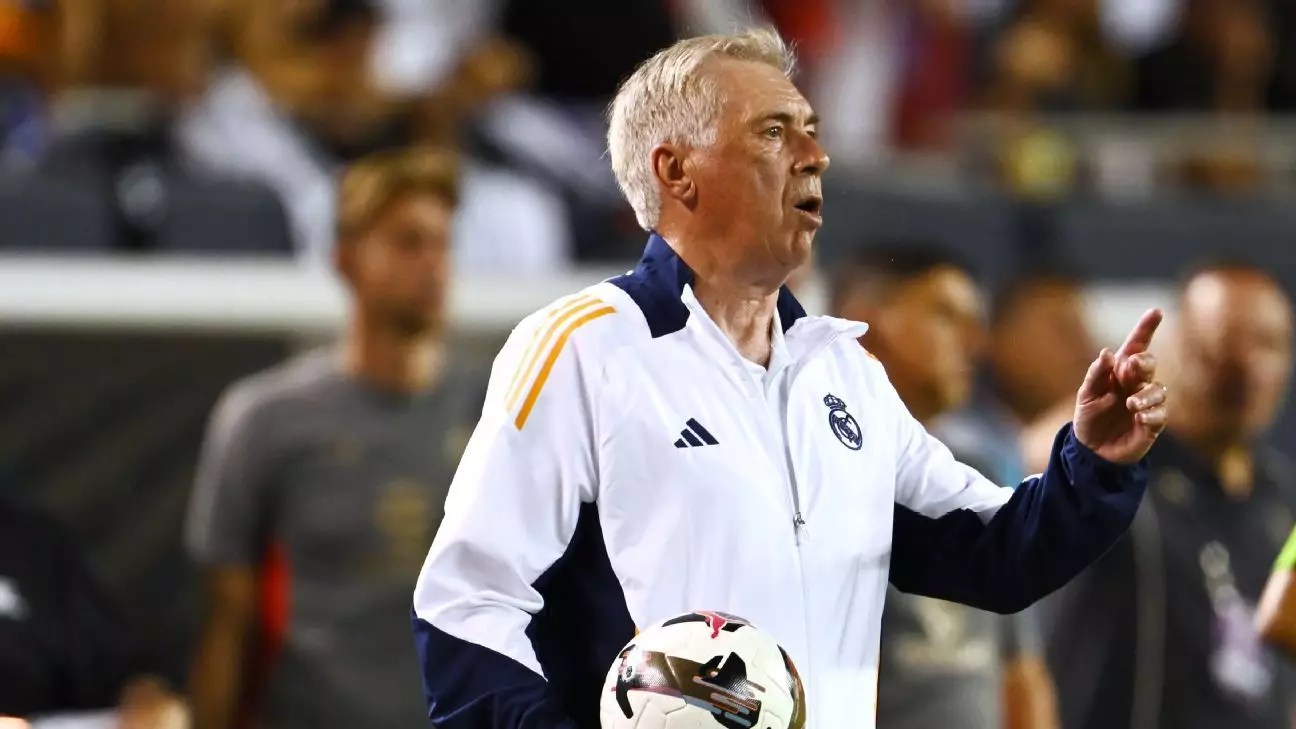The landscape of professional football has undergone significant transformations, particularly regarding players’ workload and match frequency. As clubs strive for lucrative participation in expanded tournaments like the Champions League and the revamped Club World Cup, concerns about the physical toll on players have escalated. This reality was recently addressed by Real Madrid’s veteran coach, Carlo Ancelotti, who articulated a troubling convergence of financial pressures and the health of athletes in contemporary football.
During a recent press conference, Ancelotti posited that players might consider sacrificing portions of their salaries if it meant fewer matches and, by extension, a reduced risk of injury. The unprecedented number of potential games—estimated to rise as high as 85 in a single season—has ignited discontent among players who are grappling with fatigue and the existential threat of burnout. Ancelotti asserted, “If that leads to lowering salaries, the aim is for players to play less games, so I don’t think the players will have any problem to lower their wages if they play less.” This thought-provoking perspective raises critical questions on players’ autonomy over their workload versus the commercial motivations of clubs and governing bodies.
The Players’ Dilemma: Strikes on the Horizon
Recent remarks from Manchester City midfielder Rodri hint at escalating tensions within the player community, as he suggested that a strike might be a necessary course of action if the current situation does not ameliorate. This sentiment echoed across players, including Real Madrid’s Thibaut Courtois and Dani Carvajal, who have lent their support to calls for change. Ancelotti emphasized the futility of such protests in the immediate context, noting that player complaints are unlikely to alter the already set calendar for the current season. “The complaints of coaches and players are not going to change this season’s calendar,” he stated. The looming threat of a strike adds urgency to the conversation about the sport’s future, further highlighting the disconnect between the commercial gears driving the football machine and the players’ physical and mental capacities.
As the season progresses, Ancelotti remains focused on maintaining his team’s form while navigating the tumultuous waters of a crowded fixture list. Real Madrid recently secured a hard-fought victory against Stuttgart, and Ancelotti noted, “Against Stuttgart we showed some great plays. I think we play beautiful football.” He acknowledged that while the team has potential for improvement, their aspirations must align with protection against injuries. “Can we play better? Yes, sometimes,” the coach remarked, emphasizing the importance of winning, but also the necessity of maintaining player health throughout a grueling schedule.
Another critical discussion point in the press conference was Ancelotti’s approach to team formation. Fan expectation for a transition to a four-man midfield was met with skepticism by the coach, who noted that achieving balance is more about collective effort than merely altering lines of operation. Ancelotti stated, “Balance is a collective work. To add one more midfielder doesn’t necessarily mean you have more balance.” This approach speaks to his philosophy of evolving team dynamics while espousing the necessity of cognitive cohesion among players.
Also noteworthy is Ancelotti’s update on the promising Brazilian forward, Endrick, who has quickly impressed the coaching staff with his performance since joining the ranks. Ancelotti confirmed, “He will be a starter in the next few games and in the future. I think that is obvious with the quality he has.” The integration of young talent can serve dual purposes: revitalizing a squad fatigued by its own excessive demands, and providing fresh energy as older players face the daunting prospect of managing extensive match calendars.
A Call for Change
As football continues to evolve with its commercial aspirations, the need for a recalibration regarding player welfare is clearer than ever. The delicate balance between profit and player health remains a point of contention, encapsulated in Ancelotti’s insights. Addressing these issues requires a comprehensive dialogue among stakeholders, including players, coaches, and governing bodies. Collaborative efforts to mitigate overloading may not only save players from the brink of burnout but also enhance the quality of play, ensuring that football retains its essence as a game of skill, passion, and resilience in the seasons to come.


Leave a Reply